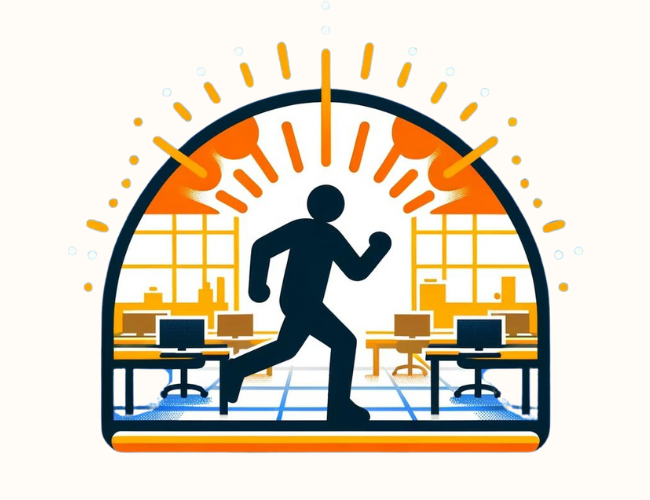One of the drawbacks of remote work is its effect on the prevalence of overworking. According to a survey conducted by the Los Angeles-based staffing firm Robert Half, nearly 70% of professionals who transitioned to remote work because of the pandemic say they now work on the weekends, and 45% say they regularly work more hours during the week than they did before. Moreover, as Corinne Purtill notes in her article, Companies Can’t Stop Overworking, “when offices reopen in earnest, few expect overwork to vanish.”
These results give employers reason for pause. Before companies assume that they can let overwork go unaddressed, they ought to think carefully about whether or not this is a desirable outcome and how they can avoid it if it’s not.
Overwork Is Bad For Employees and Employers
Studies are beginning to confirm what many have long suspected, namely that excess work is bad for employee health. A recent meta-analysis of 243 studies that examined the effects of long working hours on health found a positive correlation between extended hours and cardiovascular disease, hypertension, chronic fatigue, stress, anxiety, poor sleep quality, alcohol use, and smoking.
Some may think that while overwork is bad for employees, it’s not bad for business. After all, how could more working hours not lead to more work being done? This way of thinking is wrong-headed for a number of reasons. To start with, employees who experience negative health effects like cardiovascular disease and hypertension which come with increased mortality rates, likely won’t be working for as many years. On top of that, for the years that they are working, they may need to take time off to treat the illnesses they are suffering from. Lastly, because anxiety, depression, and sleep deprivation have all been linked to a number of cognitive impairments (e.g., impaired attention, working memory, long-term memory, decision-making ability, and cognitive flexibility), employees working extended hours may make more mistakes and get less work done overall than they would have had they simply worked fewer hours.
Why Many Overwork Anyway
Some companies have tried to discourage their employees from overworking. In many cases, their efforts have not been successful. This raises the question, if overworking is bad for one’s emotional and physical health, why would anyone continue working 70 plus hours per week when their bosses are telling them not to? In her interview with Purtill, Alexandra Michel, who has been following investment bankers for the past twenty years, offers some potential explanations.
- Reward Structures: Michel notes that in some cases, the problem lies with reward structures that incentivize overworking. She states:
When an organization says ‘we value work-life balance, we want our people to not work on weekends, we want blah blah blah’—there is still this competitive structure where people have an incentive to work all they can because others are doing the same thing, and only winners get rewarded.
- Social Status: Michel believes that for many people, a desire for status and respect is the most powerful motivator. She states:
In the end, if you ask me, what is the one true fear? […] It’s the loss of social status. It’s not the money. It is that people who formerly looked at you with respect and esteem will all of a sudden ignore you.
This explanation receives some backing by theories in the psychology of motivation. For example, according to Abraham Maslow’s hierarchy of needs, which categorizes and ranks needs or desires in terms of the importance attributed to them, individuals must satisfy their need for esteem, which includes prestige and the feeling of accomplishment, before they can focus on the fifth and final need of “self-actualization.”
- Lack Of Knowledge: Some employees may continue overworking because they don’t know just how bad it is for them or that it might decrease their productivity.
How Should Employers Respond
Below are a few suggestions employers can practice to reduce employee overwork.
- Change The Reward Structure: If overworking is due to reward structures that incentivize it, then it stands to reason that one can combat overworking by changing the reward structure. This is the response that companies like PricewaterhouseCoopers (PwC) and Boston Consulting Group have chosen. More specifically, as Purtill notes, PwC recently announced:
that it will pay a $250 bonus, up to four times a year, to employees who take a full consecutive week of vacation. Boston Consulting introduced options for employees to take up to two months off or reduce their work schedules while remaining on their career tracks
- Boost Social Status: Another option is to boost the degree of social status that employees associate with their position. Some businesses have attempted to accomplish this by changing their employees’ job titles to ones that sound more respectable. However, this is unlikely to be enough on its own. When possible, it is important to accompany job title changes with status conferring changes in the job itself.
- Educate: To the extent that employees are motivated to work excess hours because they have false beliefs about the effects of overworking, employers can address the problem by distributing the relevant articles and research papers to educate them on the consequences of such behavior.












